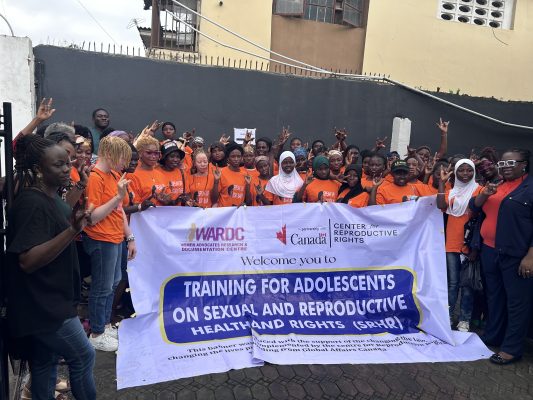The Women Advocates Research and Documentation Centre (WARDC), in partnership with Global Affairs Canada (GAC) and with support from the Centre for Reproductive Rights, is advancing the “Changing the Law, Changing Lives” project to strengthen government accountability on access to Sexual and Reproductive Health and Rights (SRHR) for adolescent girls and women in Nigeria.
According to the Founding Director, WARDC, Dr. Abiola Akiyode-Afolabi, the initiative, implemented in Lagos, focuses on training adolescents and young women on SRHR issues, fostering dialogue to assess awareness and access to key services.
Topics covered include menstrual hygiene, legal and psychosocial support for victims of rape and incest, youth-friendly health services, and Hello Lagos programmes. The goal is to ensure that young women not only understand their rights but also receive respectful, quality SRHR care.
One of the trainers who is also the host of My Period Stories Mental Health Campaign, Anike Adefunke Treasure, stressed the urgent need for an inclusive approach to menstrual and reproductive health.
“People with disabilities also menstruate. They have the same reproductive rights as everyone else. The government should create a comprehensive health policy that includes menstrual and reproductive health for young people and persons living with disabilities,” she said.
She called for the criminalisation of non-consensual sterilisation, highlighting that some girls and women with disabilities are subjected to sterilization through drugs or injections without their consent, often by caregivers. “Bodily autonomy is a fundamental human right. Living with a disability does not mean forfeiting the right to procreate or make decisions about one’s body,” she emphasised.
Anike further urged policymakers to institutionalise pad banks in secondary schools, particularly in rural and underserved areas, to reduce absenteeism caused by lack of menstrual products. “Menstruation should never be a barrier to education. Our legislators and relevant ministries must prioritise pad banks as a matter of policy,” she said.
The “Changing the Law, Changing Lives” project aligns with WARDC’s broader mission to bridge gaps in SRHR access, protect the rights of adolescent girls and women, and advocate for policies that ensure no one especially those living with disabilities is left behind.



